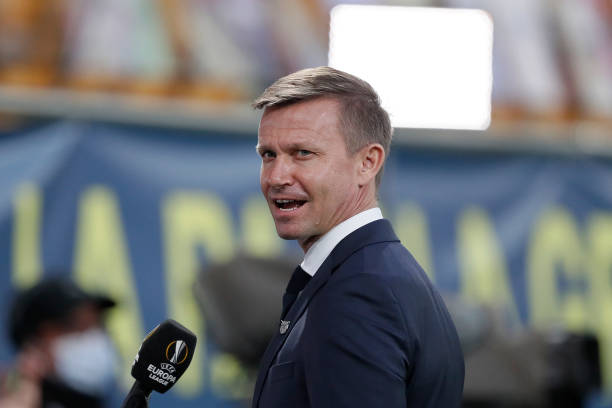Leeds United underwent a significant transformation during Jesse Marsch’s brief tenure as manager, marked by a flurry of player signings that failed to deliver the desired impact at Elland Road.
Appointed to succeed Marcelo Bielsa in February 2022, Marsch faced the daunting task of steering Leeds away from relegation, a goal he narrowly achieved before his dismissal a year later with the club hovering just above the drop zone.

During Marsch’s time, Leeds made twelve signings, each intended to bolster the squad. However, the success rate was disappointingly low, prompting a retrospective look at where these players stand today.
Brenden Aaronson, originally linked with Leeds during Bielsa’s era, finally arrived in a high-profile move from Red Bull Salzburg for £25 million. Despite early promise, Aaronson struggled to justify his price tag, grappling with the physical demands of the Premier League.
Luis Sinisterra, another touted signing, showed glimpses of potential but battled fitness issues that sidelined him during critical relegation battles. He eventually moved to Bournemouth, with Leeds recouping their initial investment.
Tyler Adams, arguably one of Leeds’ better performers under Marsch, saw his season cut short by injury, severely impacting the team’s form. His subsequent move to Bournemouth for £20 million underscored his importance.
Rasmus Kristensen, familiar with Marsch’s coaching from Salzburg, struggled to adapt to Leeds’ style and was loaned to Roma after a lackluster season.
Marc Roca, known for his patient passing, found himself out of sync with Marsch’s fast-paced strategy, leading to a loan spell and eventual permanent move to Real Betis.
Darko Gyabi, part of the Kalvin Phillips deal with Manchester City, struggled to break into the first team and spent significant time on loan at Plymouth Argyle.
Sonny Perkins, highly regarded upon arrival, failed to establish himself in the senior squad, spending a spell at Oxford United and now on loan at Leyton Orient.
Wilfried Gnonto made a promising start but fell short as Leeds faced relegation, enduring transfer speculation before settling back at Elland Road.
Joel Robles, brought in as a backup goalkeeper, departed after a brief stint and now plays for Al-Qadsiah in Saudi Arabia.
Weston McKennie’s loan stint from Juventus was forgettable, making just one appearance and acknowledging his subpar form before returning to Italy, where he revived his career.
Max Wober, a defensive addition, opted for a loan spell at Borussia Monchengladbach and is now back at Leeds, possibly up for sale.
Georginio Rutter, Leeds’ record signing at £36 million, struggled to make an impact initially but excelled in the promotion bid the following season, earning fan acclaim and staying committed to the club despite interest from top European sides.
In retrospect, Marsch’s tenure at Leeds was marked by ambitious signings that largely failed to elevate the team’s performance, reflecting the challenges of integrating new players into a demanding league. As Leeds regroups for future seasons, the lessons learned from these signings will undoubtedly shape their approach to player recruitment and squad building.
underwent a significant transformation during Jesse Marsch’s brief tenure as manager, marked by a flurry of player signings that failed to deliver the desired impact at Elland Road.
Appointed to succeed Marcelo Bielsa in February 2022, Marsch faced the daunting task of steering Leeds away from relegation, a goal he narrowly achieved before his dismissal a year later with the club hovering just above the drop zone.
During Marsch’s time, Leeds made twelve signings, each intended to bolster the squad. However, the success rate was disappointingly low, prompting a retrospective look at where these players stand today.
Brenden Aaronson, originally linked with Leeds during Bielsa’s era, finally arrived in a high-profile move from Red Bull Salzburg for £25 million. Despite early promise, Aaronson struggled to justify his price tag, grappling with the physical demands of the Premier League.
Luis Sinisterra, another touted signing, showed glimpses of potential but battled fitness issues that sidelined him during critical relegation battles. He eventually moved to Bournemouth, with Leeds recouping their initial investment.
Tyler Adams, arguably one of Leeds’ better performers under Marsch, saw his season cut short by injury, severely impacting the team’s form. His subsequent move to Bournemouth for £20 million underscored his importance.
Rasmus Kristensen, familiar with Marsch’s coaching from Salzburg, struggled to adapt to Leeds’ style and was loaned to Roma after a lackluster season.
Marc Roca, known for his patient passing, found himself out of sync with Marsch’s fast-paced strategy, leading to a loan spell and eventual permanent move to Real Betis.
Darko Gyabi, part of the Kalvin Phillips deal with Manchester City, struggled to break into the first team and spent significant time on loan at Plymouth Argyle.
Sonny Perkins, highly regarded upon arrival, failed to establish himself in the senior squad, spending a spell at Oxford United and now on loan at Leyton Orient.
Wilfried Gnonto made a promising start but fell short as Leeds faced relegation, enduring transfer speculation before settling back at Elland Road.
Joel Robles, brought in as a backup goalkeeper, departed after a brief stint and now plays for Al-Qadsiah in Saudi Arabia.
Weston McKennie’s loan stint from Juventus was forgettable, making just one appearance and acknowledging his subpar form before returning to Italy, where he revived his career.
Max Wober, a defensive addition, opted for a loan spell at Borussia Monchengladbach and is now back at Leeds, possibly up for sale.
Georginio Rutter, Leeds’ record signing at £36 million, struggled to make an impact initially but excelled in the promotion bid the following season, earning fan acclaim and staying committed to the club despite interest from top European sides.
In retrospect, Marsch’s tenure at Leeds was marked by ambitious signings that largely failed to elevate the team’s performance, reflecting the challenges of integrating new players into a demanding league. As Leeds regroups for future seasons, the lessons learned from these signings will undoubtedly shape their approach to player recruitment and squad building.
